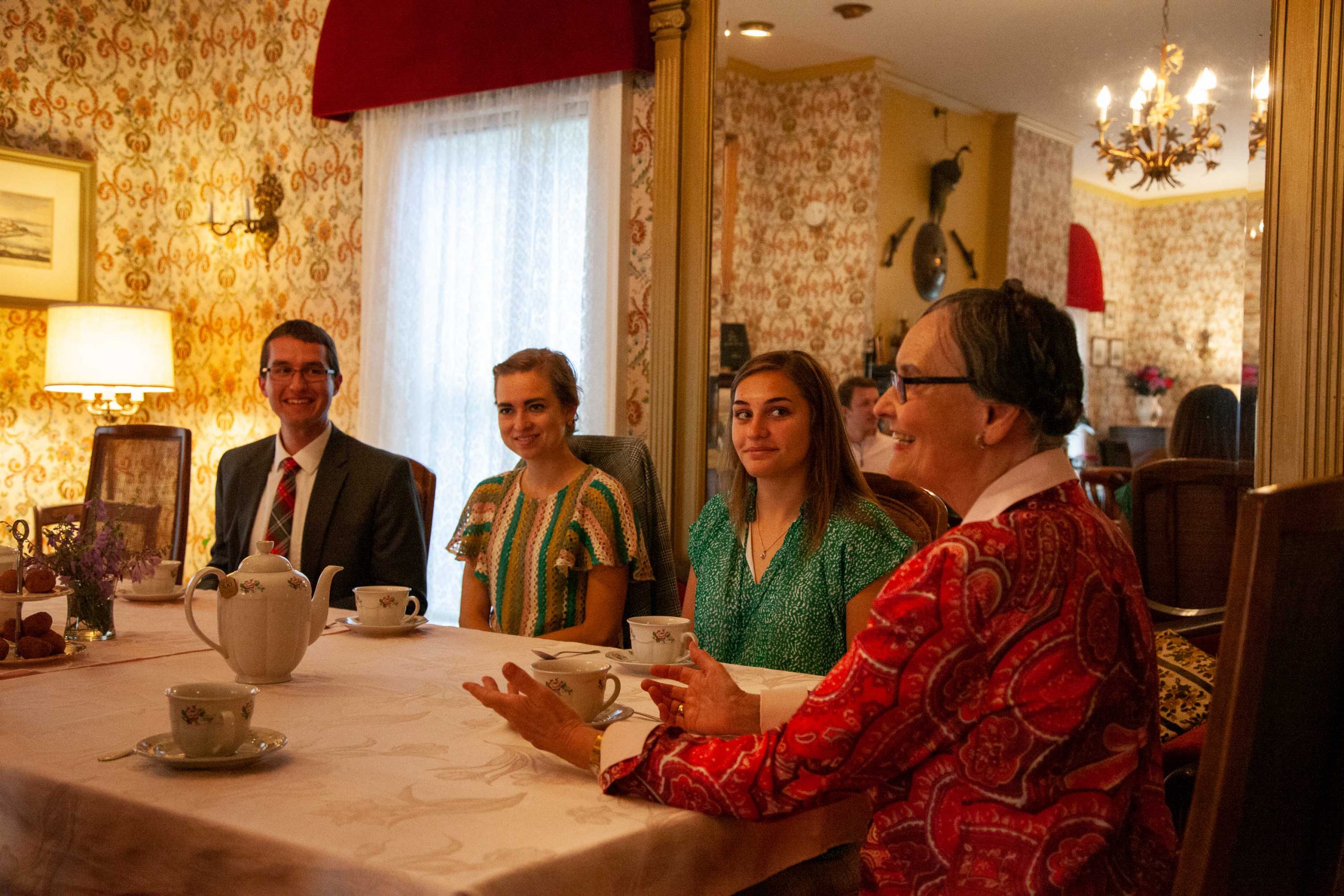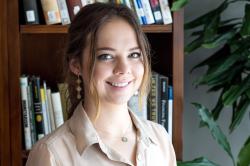Sixty-two miles north of Grand Rapids, MI sits the village of Mecosta with a population of only 450. Right off Main Street, tucked away in an arbor of oaks and ferns, stands a large brick house. Here, what was once a furniture repair shop has now become a home and a haven for conservative study and discourse. This is the home of Annette and Russell Kirk.
Russell Amos Kirk was born in 1918 in Plymouth, MI. He set out to make the ideas of past conservative-thought leaders more accessible to a new generation through his work as an author, editor, and lecturer. He was uninterested in promoting a party agenda. Rather, he sought to promote a way of life and a moral societal order guided by what T. S. Elliot called the “permanent things.” Russell was about conserving conservatism as a philosophy and was opposed to ideology. In fact, he describes conservatism as the “negation of ideology.” While Russell is well-known for his highly-esteemed books and essays, Annette has played and continues to play a large role in the preservation of his work.
Russell wrote many influential books and essays in which he critiques culture, discusses morality, analyzes political theory and outlines the tenets of conservative thought. He is best known for his 1953 historical narrative and apologetic, “The Conservative Mind,” which relays the development of conservatism throughout history. Thanks to his commitment to careful thinking and the “permanent things,” conservatism has a respected voice. Thanks to his wife, Annette, conservatism has a home.
At the age of twelve, Annette Yvonne Cecil Courtemanche Kirk became involved in politics, working beside her mother, Mary Cullen, to help with presidential campaigns and local initiatives. This early participation is where Annette says her “passion for politics and for ideas” was born. Politics was, in fact, a family affair in Annette’s family. “So many times on the night… we would be at the subway station at Parsons Boulevard, handing out flyers for whatever the cause was,” she told us. “And that is how I became interested in doing things outside of the house and also for the good of the community.”
In February 1960, Annette, still an undergraduate at Molloy College for Women in New York City, gave a presentation on Russell’s book “The American Cause.” Unbeknownst to her, Russell sat in the audience. Bradley Birzer, professor of history and chairman of the Russell Amos Kirk American Studies at Hillsdale College, recounts in his biography about Kirk that Russell admired the young Annette. Russel recounts how, “Her carriage was perfect, and she spoke clearly, with a high seriousness, her eyes demure. Hers was an exquisite beauty, a unique one, difficult to describe.”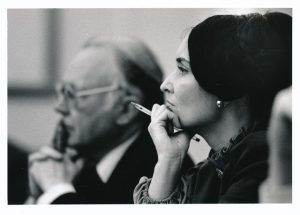
They met shortly afterwards, and in Annette’s words, their common interests confirmed them as “kindred spirits.” While Annette finished college, she strategically invited Russell to speak at events she was organizing over the span of two years. Through this maturation of their friendship, Annette describes how her respect for Russell only grew. “So that is how I got to dovetail my understanding of mission with my appreciation of his thought and then with his person, because I came to see him … as opposed to an objective view, in a more subjective view.” More speaking events and trips to Europe followed, and Russell wrote her daily for a full year. As Annette put it, their marriage became “inevitable.” On September 19, 1964, Russell and Annette exchanged vows, and they moved to Russell’s place in Mecosta to make their home.
Upon settling in Mecosta, Russell and Annette regularly hosted students, professors and the vulnerable in their home. Russell once wrote that “[The conservative] thinks that happiness comes from duty done and from understanding the vanity of human wishes.” Russell took these words not just to heart, but to hand, and the Kirks quickly became known for their hospitality and generosity. Russell and Annette became known for offering hospitality to those in need. While in Mecosta, they housed a homeless man, escapees of communism, single mothers and many others as needs arose, all while raising four daughters.
At the local level, Annette played her part in reviving Little River School and the Morton Township Library. She also assisted Laura Bush’s Foundation for America’s Libraries and was appointed by President Ronald Reagan to the National Commission on Excellence in Education.
In 1995, a year after Russell’s death on April 29, 1994, Annette and her son-in-law, Jeff Nelson, established the Russell Kirk Center for Cultural Renewal. With Annette’s energy and Russell’s library of 15,000 books, their home has since been a lively center for conservatism. Twenty-five years later, Annette continues to head the Center and promote Russell’s work and ideas. At the age of 79, she graciously hosts students, scholars and conservatives of all backgrounds from around the country. Students come to the center to participate in seminars, explore the Kirks’ library and even sit down for a meal with Annette herself.
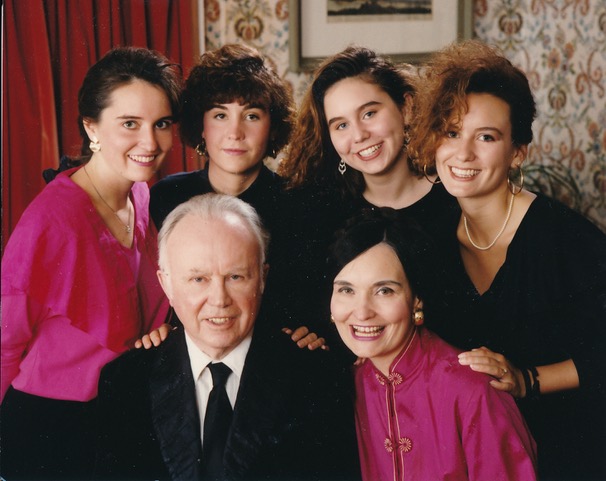 The Wilbur Fellowship was one of the first tangible projects to this end. Starting in 1979, last year the Wilbur Fellowship Program celebrated its 40th anniversary. The fellowship is named in honor of Marguerite Eyer Wilbur, an academic peer and friend of Russell. In his own words, the foundation is designed for “the nurturing of the moral imagination among those who write and read.” Since its inception, Cecilia Kirk, second daughter of Annette and Russell and the Publications Manager at the Kirk Center, says that over 300 scholars have participated in the program. Kris Beers, administrative assistant at the Kirk Center, admits that, “you look at Mecosta on a map, and you don’t expect much of it… [but] we do have this magic bookstore down the street. We do have these quality restaurants … You have places that you can be intellectually stimulated and sound within, what is the remnants of a moral context within the family bounds.” We talked over the phone with Dr. Michael Jordan, long-time friend of the Kirks and Wilbur Fellow alumnus (‘80-’82) who is now a professor at Hillsdale College, about the impact of the Kirks. He said that, “The Kirk Center actually continues the legacy of Dr. Kirk and perpetuates the vitality, community, and beauty of the Piety Hill of old, when Dr. Kirk was living.”
The Wilbur Fellowship was one of the first tangible projects to this end. Starting in 1979, last year the Wilbur Fellowship Program celebrated its 40th anniversary. The fellowship is named in honor of Marguerite Eyer Wilbur, an academic peer and friend of Russell. In his own words, the foundation is designed for “the nurturing of the moral imagination among those who write and read.” Since its inception, Cecilia Kirk, second daughter of Annette and Russell and the Publications Manager at the Kirk Center, says that over 300 scholars have participated in the program. Kris Beers, administrative assistant at the Kirk Center, admits that, “you look at Mecosta on a map, and you don’t expect much of it… [but] we do have this magic bookstore down the street. We do have these quality restaurants … You have places that you can be intellectually stimulated and sound within, what is the remnants of a moral context within the family bounds.” We talked over the phone with Dr. Michael Jordan, long-time friend of the Kirks and Wilbur Fellow alumnus (‘80-’82) who is now a professor at Hillsdale College, about the impact of the Kirks. He said that, “The Kirk Center actually continues the legacy of Dr. Kirk and perpetuates the vitality, community, and beauty of the Piety Hill of old, when Dr. Kirk was living.”
Wesley Reynolds, a friend of the Kirks for almost a decade now and a Wilbur Fellow alumnus (‘13), confirms the character of Piety Hill where, “unlike think tanks or other conservative institutions, [it] shares a family structure with its family-oriented ethics of the ‘permanent things.’” For the Kirks, this means an open-door policy to anyone who comes knocking. Beers says that since Russell’s death, “[Annette has been] the light bearer from that moment that [Russell] was unable to continue writing.” And she accomplished this because of her foresight to “set the foundation at the home so that he could do everything that he needed to do.”
As an observer, John Rau, the local book-keeper of Mecosta Bookstore on Maine Street, says that “I like the Kirk Center because I can definitely say to people… that it’s a compassionate, conservative think tank… I’ve been saying that even before the last several years.” John explains how compassion is a matter of integrity, it’s “doing the right thing at the right time even if it doesn’t seem compassionate.” Annette Kirk is just that—a woman of integrity who does the right thing, particularly carrying on the work of her husband Russell for the sake of future generations.
“And now it’s twenty-five years since he died, and so it’ll be almost thirty years, another five years,” Annette says. “And it will be half my life spent with him because I didn’t know him before that. … So most of my life has been concerned with his thought and working with him and now for his legacy.”
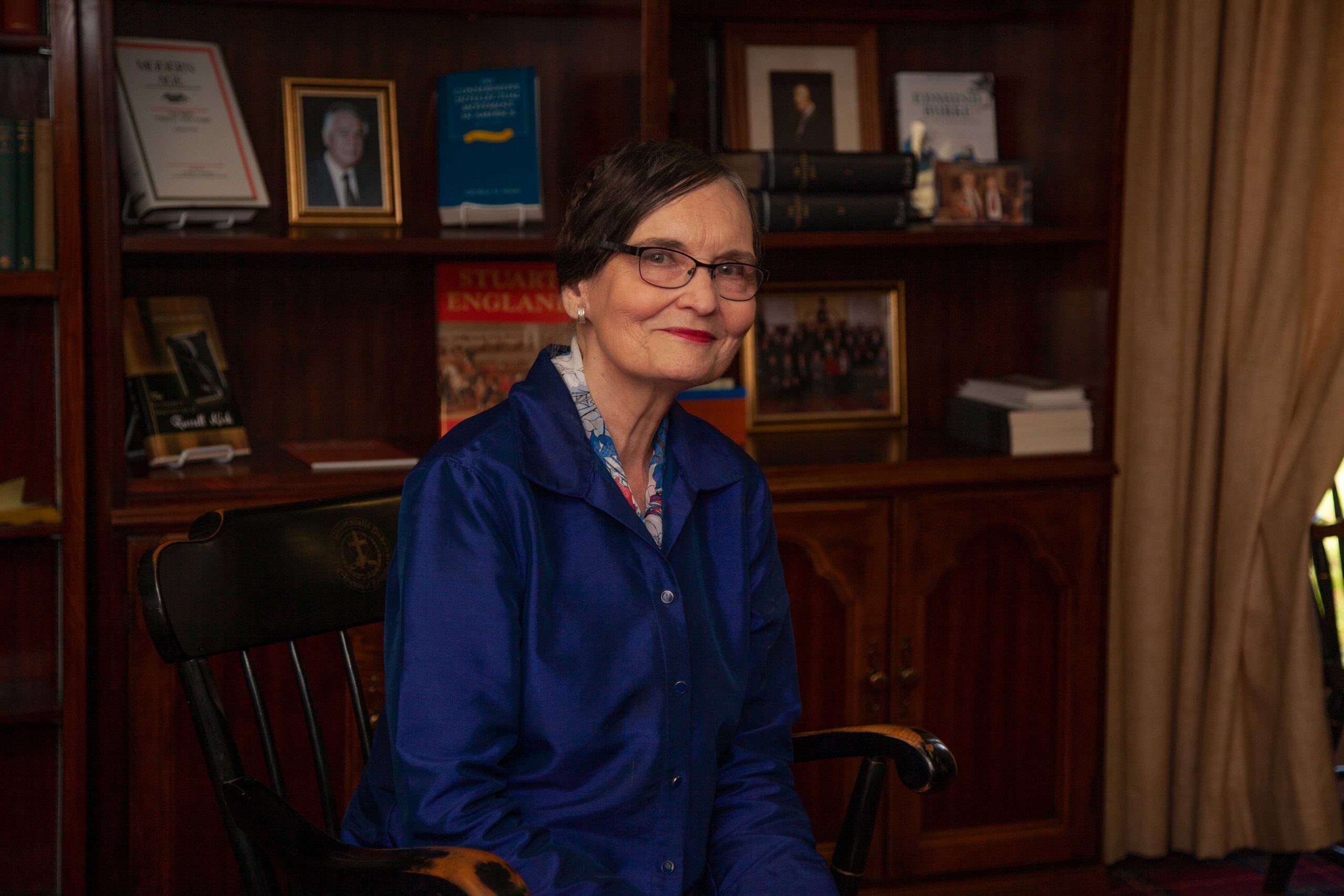
The reputation of the Kirk family is admirable. In the words of Wesley,“the Kirk Center exists as a haven for all those wearied from battling the degeneracy of our own age, and Mrs. Kirk has refurbished the armor of many a way-worn pilgrim… [Annette] exhibits the lady-like elegance of a more refined age in America; one which many believe passed forever with the closure of ‘Camelot’ in the early 1960s, but which Russell Kirk knew would live on in her. She combines genuine hospitality and wit with penetrating reason; a rare combination… Therefore, I consider the Kirk Center a moral rather than a social force.”
William F. Buckley once said of Annette that, “Never has a widow emerged more capable of carrying on her husband’s legacy.” Indeed, few other widows have the determination, much less the follow-through, to continue the work of their husband. However, Annette cannot lead the Kirk Center forever, and questions about the Center’s future remain. Annette herself hopes that “by promoting Russell’s legacy I am fulfilling what I think God wants me to do. And so I think that it’s not as important that it’s actually his legacy and that his name is attached to the ideas and convictions that we are trying to espouse. I think what’s important is that those ideas get out there.”
